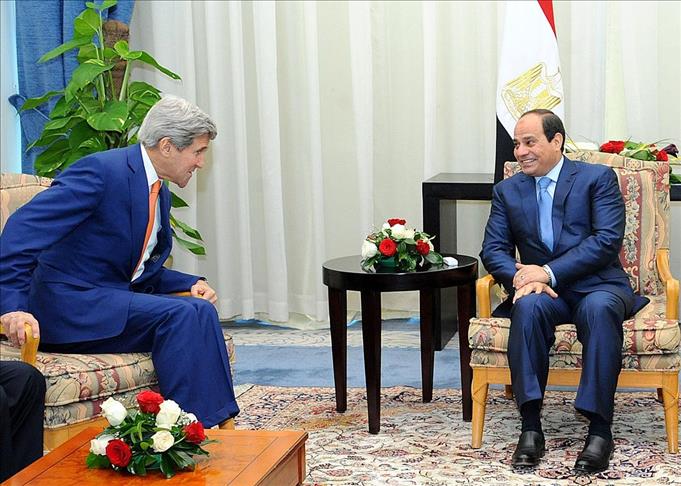Restoration of Egypt’s military aid strategic US move: Experts
Decision to restore military aid raises questions about US’ concern for human rights in Egypt.

WASHINGTON
President Barack Obama's decision to restore military assistance to Egypt has raised the argument that strategic considerations have prevailed human rights and democratic values in U.S. policy toward Egypt.
Obama last week informed Egyptian President Abdel Fattah al-Sisi by phone that he would lift an executive hold on the delivery of aircraft,
The American president also pledged to request from Congress $1.3 billion in annual military assistance
Although the U.S. withheld aid to Egypt due to the administration's concerns about human rights there, only days after Obama's decision to lift the hold, a Cairo court sentenced dozens of political prisoners to life in prison or death.
The court's ruling contributed to criticism of the White House's decision while there is still not a significant change in Egypt's human rights record.
Egypt sentenced 37 defendants to life terms, with 14 others receiving death sentences, including Muslim Brotherhood Guide General Mohamed Badie.
“The human rights was not the motivation that has driven Obama’s decision to lift the hold," said Samuel Tadros, an expert at the Washington-based Hudson institute.
"Obama’s decision is a realization that democracy and human rights have never been the foundation of U.S.-Egypt relationship,” he added.
Tadros' argument can be traced to 2011 when mass protests across Egypt brought an end to the 31-year rule of Hosni Mubarak.
Washington preferred to remain out of the fray during the protests and was reluctant to support the post-Mubarak government led by Muslim Brotherhood-backed President Mohammed Morsi.
When Gen. al-Sisi ousted Morsi, the country’s first democratically elected president on July 3, 2013, the U.S. refrained from calling it "a military coup."
Egyptian security forces killed more than 1,000 civilians while dispersing two pro-Morsi sit-ins in Cairo's Rabaa al-Adawiya Square and Giza's Nahda Square in August 2013.
Following the government's violent crackdown on opposition protests, the U.S. decided to withhold military aid to the Egyptian government in October 2013.
But little has changed since then. According to human rights organizations in the country, around 42,000 people have been detained since the coup.
Amnesty International listed Egypt as one of the two countries foremost in issuing death sentences, with 509 people in 2014 following Nigeria with 659.
“It was clear from the beginning that nothing will change in Egypt under Sisi," said Dr. Amr Azzam, an assistant professor at Shawnee State University in Ohio.
Tadros, the Hudson Institute expert, also agreed with Azzam and pointed out that the two votes -- constitutional referendum and presidential election – held after Sisi took over leadership of the country
U.S. officials have intermittently addressed human rights violations and the restrictions on freedom of speech in the country and called on Sisi to respect human rights.
It was not expected, however, that the Obama administration will continue to allow tensions between Washington and Cairo for long, particularly at a time when Egypt’s neighboring Arab states such as Libya, Syria, Lebanon are rocked by turmoil.
“When the Obama administration initially blocked the payments, I don’t think that it was intended to be a long-term issue,” said Azzam.
He supported his reasoning by suggesting that the region was already in turmoil and the U.S. would not want to lose its decades-long ally in the region while crises unfolded in the region.
In addition, the upsurge of the Daesh terror group, particularly its recent actions – including the beheading of 31 Coptic Christians and several bombing in Libya – have made it imperative for the U.S. to reconsider the military relations with Egypt.
Obama administration officials have admitted that the U.S. decided to lift the hold on military assistance based on challenges Egypt faces in the Middle East.
White House National Security Council spokeswoman Bernadette Meehan said the administration has reviewed "the military assistance relationship" between the two states under the current circumstances in the Middle East.
Washington's move came just days after Sisi announced he was sending four warships to aid Saudi Arabia in the fight against Iranian-backed rebels in Yemen which raised the question of whether Obama rewarded Sisi for his role in the war with Yemen.
State Department spokeswoman Marie Harf also reiterated that the decision to lift the hold on military aid was related to the challenges in the region.
"The recent decision," Harf said, "neither suggests that the human rights situation in Egypt has improved nor represents some sort of endorsement of the government of Egypt's approach to domestic dissent."
Harf's comments, however, were not enough to explain the inconsistency in the U.S.’s position regarding Egypt's human rights record.
In a statement she released regarding the Cairo court's decision about the activists, Harf said the U.S. is "deeply disappointed" about the court's decision to sentence an American-Egyptian activist Mohamed Soltan to life in prison.
Thirty-six others received the same sentence and 14 others were sentenced to death, but Harf's remarks did not mention any of the remaining activists.
Anadolu Agency website contains only a portion of the news stories offered to subscribers in the AA News Broadcasting System (HAS), and in summarized form. Please contact us for subscription options.







